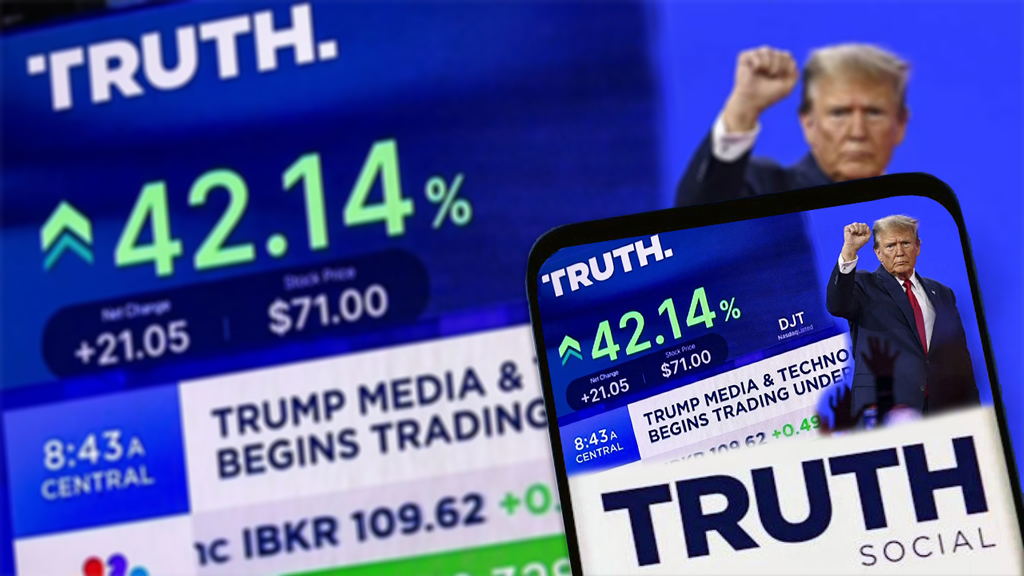Social media seems to have come to the rescue for Trump, who’s eyeing a return to the presidential race and grappling with financial woes due to recent hefty court fines. In a case brought by New York prosecutor Letitia James, Trump was hit with a record $454 million fine, but he couldn’t come up with the necessary bond to prevent his assets from being seized during the appeals process. After the court accepted a $175 million bond and granted additional time, Trump, who owns 60% of the Truth Social platform, saw it go public on the Nasdaq exchange on Tuesday. Within a week, the company, traded under the symbol DJT, experienced around a 70% increase, reaching a market value of $8 billion and effectively adding about $4.5 billion to Trump’s net worth on paper. Although Trump won’t be able to sell his shares for six months due to stock market rules, he can potentially use them as collateral to secure the required bond from insurance companies.
Trump, a prominent user of social media, had launched the Truth Social platform after being banned from Twitter and Facebook. While the platform failed to attract a broader audience beyond his own followers, Trump didn’t return to other social media platforms even after the bans were lifted. Despite generating $3.4 million in revenue last year, Truth Social incurred a $49 million loss and doesn’t promise a profitable future as a social media company. However, the fact that it was established by a potential future president like Trump seems to appeal to many investors. Moreover, it wouldn’t be surprising if Trump’s supporters continue to drive up the value of the shares to show their support for him, regardless of the company’s economic performance. There are clearly investors who want to get in early on the stock, anticipating an increase in value if Trump’s campaign gains momentum in the election year.
There have been numerous examples of similar hysteria-driven phenomena in the American economy, with examples like the ‘meme stock’ frenzy during the pandemic. Some individual activist investors, organizing on social media, managed to save Gamestop from bankruptcy by bursting institutional investors’ ‘short’ positions. As a result of many young people entering the stock market during the global pandemic lockdown, traditional investors found themselves facing a challenge.
Despite occasionally causing losses for institutional investors, retail investors, as seen in the Gamestop example, haven’t been able to sustain such successes in the long run. A similar process occurred in the crypto markets through ‘meme coins’ like Dogecoin. Unlike digital currencies like Bitcoin and Ethereum, which are based on specific projects, meme coins like Dogecoin reached a market value of billions of dollars despite not being backed by any substantial project. Some Dogecoin investors, hopeful of Elon Musk’s support and optimistic about his future announcements, still hold on to this hope. Musk’s ability to influence the masses and his brand name resemble those of Trump.
These meme coins, which defy traditional investment models and even mock them, have generated a certain level of ‘value’ despite not having a classical economic counterpart. In a way, they symbolize individuals’ and retail investors’ rebellion against the established order of finance. In this context, Meme coins continue to be bought and sold with a market value that cannot be ignored, but it’s difficult to say if they have had a lasting transformative effect on the system.
Trump’s entry into the stock market through Truth Social, which doesn’t have a clear plan or claim to turn a profit, can be perceived as mocking the American financial system, much like meme stocks and meme coins. While this move could be highly effective in improving Trump’s financial situation, it could disappoint many investors if he loses the election. However, it’s known that many aren’t focused on long-term economic value creation and are instead aiming to make quick money in this frenzy. Ultimately, it will be Trump who shapes the financial loss perception for those who support him.
Trump had previously entered the stock market with Trump Hotels and Casino Resorts, under the same DJT symbol, in 1995. However, the company suffered a $600 million loss and filed for bankruptcy in 2004, despite Trump considering the project highly successful. The fate of Truth Social remains uncertain, but for now, it seems to have provided Trump with a significant financial lifeline and an exit strategy. While there have been many companies in the American stock market that have suffered losses for years but managed to attract investors due to their ability to generate economic value (such as Uber, Amazon, etc.), it’s hard to claim that Trump’s company produces a similar value. Therefore, the ‘enthusiasm’ surrounding DJT should suffice for Trump until the November elections.
[Yeni Şafak, March 30, 2024]



